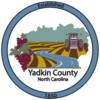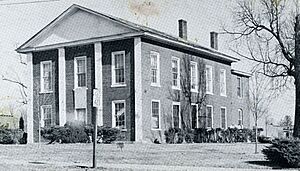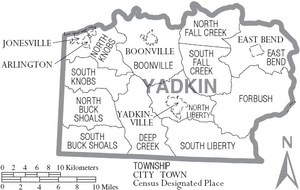Yadkin County, North Carolina facts for kids
Quick facts for kids
Yadkin County
|
|||||
|---|---|---|---|---|---|
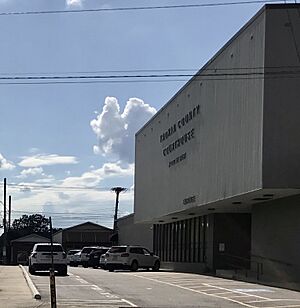
Yadkin County Courthouse
|
|||||
|
|||||
| Motto(s):
"Come for a visit, stay for a lifetime"
|
|||||
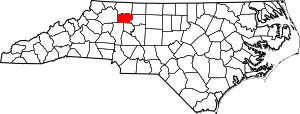
Location within the U.S. state of North Carolina
|
|||||
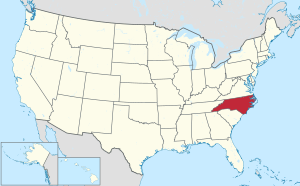 North Carolina's location within the U.S. |
|||||
| Country | |||||
| State | |||||
| Founded | 1850 | ||||
| Named for | Yadkin River | ||||
| Seat | Yadkinville | ||||
| Largest community | Yadkinville | ||||
| Area | |||||
| • Total | 337.71 sq mi (874.7 km2) | ||||
| • Land | 334.94 sq mi (867.5 km2) | ||||
| • Water | 2.77 sq mi (7.2 km2) 0.82% | ||||
| Population
(2020)
|
|||||
| • Total | 37,214 | ||||
| • Estimate
(2023)
|
37,774 | ||||
| • Density | 111.11/sq mi (42.90/km2) | ||||
| Time zone | UTC−5 (Eastern) | ||||
| • Summer (DST) | UTC−4 (EDT) | ||||
| Congressional district | 5th | ||||
Yadkin County is a county located in the state of North Carolina. In 2020, about 37,214 people lived there. The main town and county seat is Yadkinville.
Yadkin County is part of the larger Winston-Salem area. This area is also part of the Greensboro–Winston-Salem–High Point region.
Contents
History of Yadkin County
Early Settlers and Formation
The land that is now Yadkin County was once home to the Tutelo and Saponi Native American tribes. European settlers began moving into the area around 1748. People here lived more like those in the mountains to the west. This was different from other parts of the Piedmont or eastern North Carolina.
Over time, the county became a place mostly for small white farmers. There were also some large landowners who had enslaved people. A few free Black people and Native Americans also lived there.
Becoming a County
The area was first part of Anson County. Then, in 1750, it became part of Rowan County. In 1770, it moved to Surry County.
Finally, in 1850, North Carolina decided to create Yadkin County. They took the part of Surry County south of the Yadkin River. This was done to help local political groups. When it was formed, 9,808 people lived there. Most were white, but there were also free people of color and enslaved Black people. The town of Wilson was chosen as the county seat. In 1852, its name was changed to Yadkinville.
Growth and the Civil War Era
From 1850 to 1860, Yadkin County grew in population and economy. It was still mostly rural and focused on farming. But it also had mills, stores, distilleries, and a tobacco factory.
Before the American Civil War, many people in Yadkin County supported the Whig party. They also liked John Bell in the 1860 election. When Abraham Lincoln was elected president, North Carolina thought about leaving the United States. Yadkin voters strongly voted against holding a meeting to consider leaving. However, after Lincoln asked for soldiers, North Carolina did leave the United States and joined the Confederate States of America.
Men from Yadkin County fought in the Confederate States Army. Many would go home to help their families with farming. Then they would return to duty. The draft was not popular in the county. Some people avoided joining the army because they supported the Union. Others, like local Quakers, had religious reasons against war and slavery. Some people who avoided the draft hid in the woods or caves. Others went to pro-Union areas in the mountains.
After the Civil War
After the war, the Republican Party became very strong in Yadkin County. Many people liked it because it was against slavery. It also supported a strong national government and spending money on roads and other improvements. Yadkin County continued to support the Republican Party. This was true even when the Democratic Party became powerful in North Carolina in the 1870s.
Some parts of Yadkin County were later added to Forsyth County in 1911 and 1927. The county got its first paved roads in the 1920s.
By the mid-1900s, Yadkin's economy was mostly about growing tobacco. Many people who did not work in farming traveled to Winston-Salem for jobs. In 1971, Unifi Manufacturing opened its first textile factory in Yadkin County. As the company grew, it became the biggest industrial employer. It also helped the area with taxes and charity. Later, the textile industry faced problems across the country. This caused the company to reduce its size in Yadkin County.
Geography
Yadkin County covers about 337.71 square miles. Most of this is land (334.94 square miles), and a small part is water (2.77 square miles). It shares borders with Surry, Forsyth, Davie, Iredell, and Wilkes counties.
Yadkin County is in the Piedmont region of North Carolina. It is in the northwestern part of the state, close to the Blue Ridge Mountains. The western parts of the county have more hills than the eastern parts. A section of the Brushy Mountains is in the northwestern area. The county is part of the Yadkin-Pee Dee River Basin. The Yadkin River forms its northern and eastern borders.
Protected Areas
- Historic Richmond Hill Nature Park
- Yadkinville Community Park
Major Water Bodies
- Beaverdam Creek
- Deep Creek
- Dobbins Creek
- Forbush Creek
- Harmon Creek
- Little Forbush Creek
- Logan Creek
- Miller Creek
- North Deep Creek
- North Little Hunting Creek
- South Deep Creek
- South Yadkin River
- Turner Creek
- Yadkin River
Population Data
| Historical population | |||
|---|---|---|---|
| Census | Pop. | %± | |
| 1860 | 10,714 | — | |
| 1870 | 10,697 | −0.2% | |
| 1880 | 12,420 | 16.1% | |
| 1890 | 13,790 | 11.0% | |
| 1900 | 14,083 | 2.1% | |
| 1910 | 15,428 | 9.6% | |
| 1920 | 16,391 | 6.2% | |
| 1930 | 18,010 | 9.9% | |
| 1940 | 20,657 | 14.7% | |
| 1950 | 22,133 | 7.1% | |
| 1960 | 22,804 | 3.0% | |
| 1970 | 24,599 | 7.9% | |
| 1980 | 28,439 | 15.6% | |
| 1990 | 30,488 | 7.2% | |
| 2000 | 36,348 | 19.2% | |
| 2010 | 38,406 | 5.7% | |
| 2020 | 37,214 | −3.1% | |
| 2023 (est.) | 37,774 | −1.6% | |
| U.S. Decennial Census 1790–1960 1900–1990 1990–2000 2010 2020 |
|||
Population in 2020
In 2020, the census showed 37,214 people living in Yadkin County. There were 15,425 households and 10,789 families.
| Race | Number | Percentage |
|---|---|---|
| White (not Hispanic) | 30,357 | 81.57% |
| Black or African American (not Hispanic) | 1,071 | 2.88% |
| Native American | 63 | 0.17% |
| Asian | 142 | 0.38% |
| Other/Mixed | 1,199 | 3.22% |
| Hispanic or Latino | 4,382 | 11.78% |
Economy
Unifi Manufacturing, a company that makes textiles, is the biggest private employer in Yadkin County. They have a large factory in Yadkinville that recycles plastic.
Transportation
Major Roads
 I-77
I-77


 Future I-685
Future I-685 US 21
US 21
 US 21 Bus.
US 21 Bus. US 421
US 421 US 601
US 601 NC 67
NC 67
Two main four-lane highways serve Yadkin County. Interstate 77 goes north to south in the western part of the county. U.S. Highway 421 goes east to west. These two highways meet near Hamptonville.
The county also has U.S. Highway 21, which runs mostly next to I-77. U.S. Highway 601 goes through Yadkinville and Boonville. North Carolina Highway 67 connects the northern part of the county with Jonesville-Elkin and Winston-Salem.
Airports
For commercial flights, people use Piedmont Triad International Airport and Charlotte Douglas International Airport. There are also two private airports in the county. These are Swan Creek near Jonesville and Lone Hickory near Yadkinville. Another airport is in Boonville on Baptist Church Road.
Public Transportation
Since 2006, the Piedmont Authority for Regional Transportation (PART) has offered some bus service. This service runs between Boone, North Carolina and Greensboro, North Carolina. It is called the US 421 Mountaineer Express. The buses stop in Yadkinville.
Yadkin Valley Economic Development District Inc. (YVEDDI) also runs a public transportation system. It serves several counties and is based in Boonville.
Education
Yadkin County has three high schools: Forbush High School, Starmount High School, and Yadkin Early College.
The Yadkin Early College is a special five-year program. Students take high school and college classes at the Surry Community College campus in Yadkin. They can earn both their high school diploma and an associate degree. Degrees can be in nursing, criminal justice, or a transfer degree for a four-year university.
Eight elementary schools feed into the high schools. These schools teach kindergarten through sixth grade. They are Boonville, Courtney, East Bend, Fall Creek, Forbush, Jonesville, West Yadkin, and Yadkinville.
The school system also has Yadkin Success Academy. This is an alternative learning center in Yadkinville.
In 2009, Yadkin County opened two new middle schools. Starmount Middle School opened in August. It serves seventh and eighth graders from Jonesville, Boonville, and West Yadkin Elementary Schools. Forbush Middle opened in November. It serves students from East Bend, Forbush Elementary, Fall Creek, Courtney, and Yadkinville Schools. Both middle schools are next to their high schools.
Surry Community College offers classes at its Yadkin Campus. It is located at 4649 U.S. Highway 601 North near Yadkinville.
Media
Print Media
Yadkin County has two local newspapers: The Yadkin Ripple and The Tribune from Elkin. The Winston-Salem Journal, a larger daily newspaper, also covers the county. Yadkin Valley Living is a magazine about lifestyle. It comes out every two months and is based in East Bend.
Broadcast Media
WSGH is an AM Spanish contemporary radio station. It broadcasts from eastern Yadkin County.
Yadkin County is part of the Piedmont Triad radio and television market. However, many broadcasts from the Charlotte area can also be received.
Yadkin Valley Wine Region
All of Yadkin County is part of the Yadkin Valley AVA. This is an American Viticultural Area recognized by the United States government. It is known as a special place for growing grapes. Wines made from grapes grown here can use the name "Yadkin Valley" on their labels. Yadkin County also has the second North Carolina AVA, which is the Swan Creek Wine Region.
Communities
Towns
- Boonville
- East Bend
- Jonesville
- Yadkinville (county seat and largest community)
Townships
- Boonville
- Deep Creek
- East Bend
- Forbush
- North Buck Shoals
- North Fall Creek
- North Knobs
- North Liberty
- South Buck Shoals
- South Fall Creek
- South Knobs
- South Liberty
Unincorporated Communities
- Barney Hill
- Branon
- Buck Shoals
- Center
- Brooks' Crossroads
- Courtney
- Enon
- Flint Hill
- Footville
- Forbush
- Hamptonville
- Huntsville
- Lone Hickory
- Longtown
- Marler
- Richmond Hill
- Swan Creek
- Union Hill
- Windsor's Crossroads
- Wyo
Former Towns
These towns were once officially recognized:
- Arlington, joined with Jonesville in 2001
- Hamptonville, started in 1818
- Huntsville, started in 1792
- Shore, recognized from 1903 to 1911
- Smithtown, recognized in 1924
Notable People
- Leo Arnaud, a film composer from France.
- Thomas Lanier Clingman, a U.S. senator and general in the Confederate army.
- William "Mo" Cowan, a U.S. senator for Massachusetts in 2013.
- William Wade Hampton (1858–1930), a state senator and representative.
- Mamrie Hart, a famous person on YouTube.
- Dickie Hemric, a basketball star for Wake Forest and the Boston Celtics.
- Richmond Mumford Pearson, a chief justice of the North Carolina Supreme Court. His son, Richmond Pearson, was a diplomat and U.S. representative.
- Richard Clauselle Puryear, a U.S. congressman.
- Ernie Shore, a Major League baseball pitcher. He was also a sheriff for Forsyth County.
- Junior Johnson (Robert Glenn), a NASCAR Hall of Fame driver and team owner.
See also
 In Spanish: Condado de Yadkin para niños
In Spanish: Condado de Yadkin para niños



